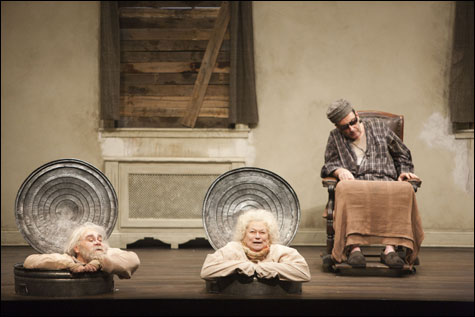
WOULD BECKETT BE HAPPY? Well, he'd be satisfied. |
"They give mirth astride of a grave," Beckett might just as well have written of Mankind. He did opine, in Endgame, that "nothing is funnier than unhappiness." And the American Repertory Theatre's scrupulously precise staging of that bleak end-of-the-world vaudeville (at the Loeb Drama Center through March 15) is downright jaunty in its dire way. The troupe got into famously hot water in 1984 when visiting director JoAnne Akalaitis relocated Endgame to what looked like a New York subway station in the wake of a nuclear holocaust; Beckett sought, without having seen it, an injunction against the production, which went up with the touchy Nobel laureate's disclaimer in the program. This time out, director Marcus Stern, set designer Andromache Chalfant, and a quartet of skilled ART stalwarts play Becket's game — in a boarded-up gray room floating in a frame of black — by the book. The master, were he still on earth (there being no cure for that), would approve — not only of the adherence but also of the heartbreaking drollery being milked from his merciless clown show at the tail end of existence.
Endgame is performed less often than Waiting for Godot (a play accurately described as one in which nothing happens — twice). But it may be even greater: less a comedy drama than a poem or a musical composition (hence the need for strict adherence to tempo). The scenario is simple, if open to interpretations ranging from the Flood to the Apocalypse. The setting is a bare interior with two windows, one overlooking what's left of the earth, the other what's left of the sea. Standing in for Vladimir and Estragon as well as for Pozzo and Lucky are Hamm, blind, paralyzed, and dictatorial, and Clov, still ambulatory enough to remove the soiled sheet from his haughtier, chair-bound counterpart and do his laborious bidding, whether the demand is for a push around the room, a report from one of the windows on an exterior that's "corpsed," or a body to bear witness as Hamm tells and retells his "story." Master and servant, the two are also surrogate father and child, their extended family consisting of Hamm's ancient, legless parents, Nagg and Nell, who are confined to ashbins and living on shards of biscuit and memory.

Probably only Beckett could sap both beauty and humor from such a desolate, suspended situation. It's a vision, really, and at the ART it's suddenly conjured — the lights abruptly discovering Clov as he sets about his morning ministrations, Hamm springing to life as his sheet is removed — and then slowly dwindles, a visual metaphor for death's final, inevitable distancing being the production design's only liberty. In between beginning and end, the actors demonstrate their command of both the play's self-reflexiveness and its mordant wit. Not only is Endgame a comedy routine, it's one that's been as often repeated as "Who's on First?", the perpetrators' small comforts including the brisk, recitative familiarity of it. Plaintively threatening for the umpteenth time to leave, Clov asks, "What is there to keep me here?" To which Hamm replies, "The dialogue."
Will LeBow's Hamm is no whip-wielding Pozzo but, in his worn robe, slippers, and toque, a sort of frowsy aristocrat, alternately barking orders and exhibiting a Noël Coward-esque noblesse oblige, invoking his story in a terse yet plummy cadence that's both touching and absurd. And Thomas Derrah's Clov, boring his fingers into his cranium as if to jump-start an idea, his body twisted by a painful limp, somehow mixes brute exasperation with insouciant showmanship. As Nagg and Nell, Remo Airaldi and Karen MacDonald are as weighed down by fright wigs and old-age make-up as they are by the ashbin lids slammed down whenever their son orders them "bottled." Still, Airaldi conveys both the bitterness and the barbed wit of the "cursed progenitor." And MacDonald, earthy in her assertions about comedy, brings a profound piquancy to her Krapp-like recollection of boating and not-yet-atrophied romance. It's going against the nature of things to suggest Beckett would be happy. Suffice to say he would be satisfied.